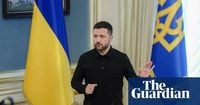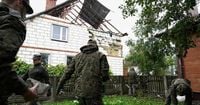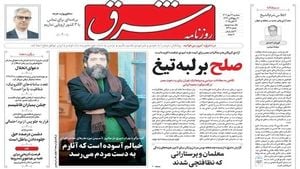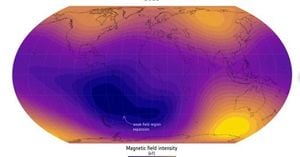On September 25, 2025, Ukrainian President Volodymyr Zelenskyy delivered a stark warning to the world from the podium of the United Nations General Assembly in New York. Addressing a room filled with global leaders, Zelenskyy declared, "We are now living through the most destructive arms race in human history," urging immediate action to counter Russian aggression and prevent a wider conflict in Europe. His speech, echoing across the assembly chamber, underscored the growing sense of alarm among European capitals and beyond as the war in Ukraine shows no signs of abating.
Zelenskyy’s address came at a critical moment. According to the Associated Press, he asserted that Russian President Vladimir Putin is not content with the current scope of the war. "Putin wants to continue this war by expanding it, and no one can feel safe right now," Zelenskyy told the 193-member body, highlighting that Russian drones and fighter jets have violated NATO airspace in Poland and Estonia, and that Russian operations are spreading across Europe. "Now Russian drones are already flying across Europe, and Russian operations are already spreading across countries," he said, underscoring the urgency of the threat.
European officials have been rattled by a recent flurry of Russian provocations. As reported by The New York Times, in just the past three weeks, Russia has flown drones into Poland and Romania, sent fighter jets into Estonian airspace, and buzzed a German Navy frigate in the Baltic Sea. Airports in Denmark and Norway were even forced to shut down due to unexplained drone activity, with Denmark’s prime minister openly speculating about Russian involvement. The Kremlin, for its part, has dismissed these concerns as "exalted hysteria," but the sense of unease in Europe is palpable.
Moldova, a small nation of 2.4 million bordering Ukraine, has found itself on the front lines of this shadow conflict. President Maia Sandu, whose pro-European government has angered Moscow, recently accused the Kremlin of orchestrating a campaign of influence operations and unrest ahead of the country’s parliamentary elections. Moldovan authorities detained 74 people linked to alleged Russian plots to incite unrest. In a passionate speech, Sandu declared, "The Kremlin believes we are all for sale, that we are too small to resist, that we are not a country but a territory. But Moldova is our home, and our home is not for sale."
Zelenskyy, in his U.N. remarks, warned that Europe "cannot afford to lose Moldova, too," and stressed that the country needs tangible support, not just political gestures. He drew a direct line between the fate of Moldova and the broader European security landscape, emphasizing that Russian interference there could have far-reaching consequences.
As the war grinds on, the technological face of conflict is evolving at a dizzying pace. Zelenskyy noted that while drones were once the domain of major powers, "Now, there are tens of thousands of people who know how to professionally kill using drones." He highlighted that even countries with limited resources, such as North Korea, are now developing tactical drones, and warned of the rise of fully autonomous weapons powered by artificial intelligence. "Companies are already working on drones that can shoot down other drones, and it’s only a matter of time -- not much -- before drones are fighting drones, attacking critical infrastructure and attacking people all by themselves – fully autonomous and no human involved except the few who control AI system," he said.
The rapid proliferation of such technologies has already had tangible effects on the battlefield. As detailed by The National Interest, Ukraine’s recent deployment of Western-supplied Army Tactical Missile Systems (ATACMS) has been a game-changer. These surface-to-surface ballistic missiles, capable of striking targets up to 186 miles away, have enabled Kyiv to hit high-value Russian targets deep behind enemy lines. The first ATACMS delivery arrived in October 2023, with a second shipment in early 2024. Initially, the U.S. restricted Ukraine from using ATACMS inside Russian territory, fearing escalation, but as the war dragged on, these limitations were lifted. The use of these advanced weapons, however, has not been without controversy; British officials have criticized Ukrainian forces for allegedly overusing or misapplying some of the Western-supplied arms.
Zelenskyy also announced a significant policy shift: Ukraine is now opening up its arms exports to allies. "We are ready to make our modern weapons become your modern security. We have decided to open up arms export. And these are powerful systems tested in a real war when every international institution failed," he said, as reported by Reuters. More than 30 countries are already part of Ukraine’s new security coalition, and Zelenskyy emphasized that these weapons are not just theoretical—they have been proven on the battlefield.
Throughout his speech, Zelenskyy painted a bleak picture of international institutions’ ability to prevent or resolve conflicts. He criticized the United Nations and other bodies as "weak," stating, "Weapons decide who survives. There are no security guarantees except friends and weapons." He argued that stopping Russia now is "cheaper than wondering who will be the first to create a simple drone carrying a nuclear warhead," and warned of the catastrophic consequences if the current arms race, now supercharged by artificial intelligence, is allowed to spiral unchecked.
European leaders, meanwhile, are grappling with how best to respond to Russia’s provocations. NATO jets have scrambled to intercept Russian warplanes, and officials from Poland and Germany have debated whether to shoot down Russian aircraft that violate their airspace. While Poland’s foreign minister threatened military action, Germany’s defense minister cautioned against falling into a Russian "escalation trap." The Kremlin, for its part, has warned that any aggression against Russia "would be met with a decisive response."
The uncertainty is compounded by shifting signals from the United States. President Donald Trump, after meeting with Zelenskyy, declared his belief that Ukraine could win back all territory lost to Russia—a marked shift from his earlier calls for Kyiv to make concessions. However, when pressed on whether he would support NATO allies who take military action against Russia, Trump was noncommittal, saying, "That depends on the circumstances." This ambiguity has left many European leaders uneasy, with Lithuania’s Žygimantas Pavilionis lamenting, "I always defend America. But I need some action from my beloved America."
As the world watches, the stakes could hardly be higher. Zelenskyy concluded his address with a call for unity and urgent action: "So we must use everything we have together to force the aggressor to stop, and only then do we have a real chance that this arms race will not end in catastrophe for all of us." With new weapons, new alliances, and new dangers, the outcome of this conflict—and the future of European security—hangs in the balance.





